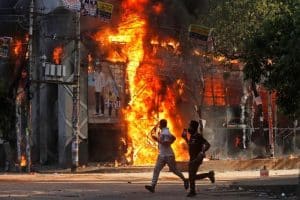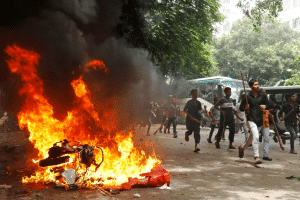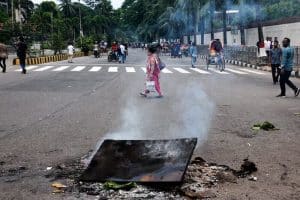PNN – The increase in the conflict between the protesters and the government of Bangladesh led to the resignation of the Prime Minister of Bangladesh, he added to the unrest by calling the demonstrators terrorists, and with the increase in the number of dead in these protests to more than 300 people, people stormed the Prime Minister’s palace and forced Sheikh Hasina to leave the country.
According to the report of Pakistan News Network, the Prime Minister of Bangladesh left Dhaka for a “safe destination” after the protests escalated following the killing of 98 other protesters.
Bangladesh Prime Minister Sheikh Hasina left Dhaka amid violent protests demanding her resignation, a source close to the Bangladesh prime minister told AFP.
The source told AFP: “She and her sister have left Gnabeban (the prime minister’s official residence) for a safer place.”
Bangladesh army also confirmed that Sheikh Hasina resigned and left the country.
Hundreds of thousands of protesters demanding Hasina’s resignation defied the curfew, marched through the streets of the capital and entered the prime minister’s palace.
According to AFP reporters, soldiers and police in armored vehicles blocked the roads leading to Hasina’s office in Dhaka with barbed wire, but large crowds poured into the streets and destroyed the barriers.
Shots fired on the body of Hasina’s government; 300 protesters were killed
Yesterday, violent clashes between police and protesters in Bangladesh resulted in the death of at least 100 people; What began as a peaceful student protest against government employment quotas appears to have turned into a nationwide campaign of civil disobedience aimed at ousting Bangladesh’s Prime Minister Sheikh Hasina.
Hundreds of thousands of protesters took to the streets on Monday, calling for a march to the prime minister’s official residence in the capital, despite the government again cutting off mobile internet across Bangladesh. In response, police blocked off the city’s main roads, but students say thousands have crossed the security barrier to join the demonstration.
So far, Hasina has refused to talk to the protesters, she said in her speech after meeting with the security officials of her country: the demonstrators are not “students”, but “terrorists” who intend to destabilize the country.
After a brief restoration of order, police arrested thousands of students and opposition activists, but the reconnection of the internet led to a flood of cellphone footage of the beatings and killings being uploaded to social media. UNICEF confirms that at least 37 children were killed during the protests, which have sparked public outrage. Bangladeshi society is witnessing hidden disappearances, Sheikh Hasina’s government is accused of involvement in almost 2,500 murders between 2009 and 2022.

UN human rights chief Volker Turk called for an end to the “shocking violence”. He called on the government of Bangladesh to stop targeting those who are peacefully participating in a protest movement, to quickly release those detained without charge, to restore full access to the Internet and to create conditions for dialogue.
However, unrest continues across Bangladesh, with thousands protesting in southern Bangladeshi cities yesterday, while 13 police officers were killed in an attack by a mob on a police station in Sirajganj district, north of Dhaka. Statues of Sheikh Mujibur Rahman, father of Hasina, the independence hero of Bangladesh, have been vandalized across the country.
While initial reports blamed security forces, including the police and border guards, for the killings, multiple reports of recent clashes have indicated that soldiers fired at Awami League-affiliated militants in defense of protesters. General Wakral Zaman, the commander of the Bangladesh Army, said on Sunday: “The armed forces always stand by the people.” General Iqbal Karim Boyian, the former commander of the army, who is an influential social figure, also condemned the “heinous killings” and asked Hasina to remove the government forces from the streets.
An anonymous Bangladeshi political expert told Diplomat Media: For the military, an important factor is how India and the international community, including the United Nations, will react, and it prefers to wait until it becomes the only option for political forces and the general public.
The source of protests; 50 years ago, the independence war of Bangladesh
The term Razakar, literally “volunteers” but meaning “traitors” or “collaborators”, became popular in Bangladeshi popular literature during Bangladesh’s nine-month war for independence from Pakistan that began on March 26, 1971. Secretaries collaborated with the Pakistan Army, which committed genocidal crimes.
However, from the beginning, the term had complications. Some secretaries were not defenders of the Pakistani government or its ideology, but were motivated by financial interests and personal vendettas. Others were forced to serve in Pakistan under pressure and threats to save their lives and their family members. Some in this category even included the Muktijoddha group which means freedom fighters of 1971. The term “secretary” thus became a symbol of extreme brutality and a strategy for survival in a period of instability.
When Sheikh Mujibur Rahman returned to his country as the Prime Minister of Bangladesh after being imprisoned in Pakistan during the war, he became embroiled in the ambivalence surrounding the category of secretaries. Realizing the need for unity in the country after the war and the fluid conditions in which secret agents were operating in different conditions, he proposed a general amnesty for secret agents and other colleagues after some trials.
From about 35,000 to 40,000 secret workers (including those registered only for investigation), about 20,000 were arrested and less than 1,000 were convicted, and the vast majority of those convicted received amnesty. Rehman’s government even sought amnesty for the masterminds of the Razkar forces and other collaborating organizations, including the two wartime governors of Dhaka, Generals Tika Khan and Abdul Malik.
The concept of secret worker in the 1990s took on a strange meaning; When old wartime group identities were revived to gain political leverage. The issue flared up over the issue of “quota” in public sector employment which was reserved for freedom fighters (muktijodha) who fought bravely for the independence of Bangladesh.

According to the government sources of the Awami League, the number of freedom fighters in 1971 was between 70,000 and 190,000 people. Considering the highest estimate, the population of this group was 0.27% of the population of 70 million in 1972. After the war, the freedom fighters were rightly honored for their sacrifices with various titles, awards and grants. In addition to these concessions, 30% of public sector jobs were allocated to this 0.27% of the population, while this number appears to be disproportionately large and not requested by the freedom fighters themselves. This discrepancy was largely overlooked due to the sympathy and respect that the fighters earned through their selfless contributions during the war.
By the third anniversary of Bangladesh’s independence in 1974, both issues of freedom fighters and secretaries were largely over. With the passing of the first generation, these issues should have taken their natural course, however, Sheikh Hasina’s government, in order to reap the political benefits of this institutionalized system, maintained the 30% quota for the children of freedom fighters in 1997, and in 2009, it extended to their grandchildren.
If nearly 30% of government jobs are filled by Awami League supporters as the quota of freedom fighters, the remaining posts are also largely inaccessible due to the abstract concept of the spirit of liberation war (Muktijuddher chetona). By resorting to this concept, anyone who is not loyal to the Awami League is effectively branded as a secret agent.

When the unemployment rate rises from 2.9% in 2009 to a conservative estimate of 5.1% in 2023, students and youth find themselves burdened by this massive discrimination and violation of the national constitution and the Universal Declaration of Human Rights regarding fair employment opportunities.
So when, in late July 2024, the outgoing prime minister of Bangladesh blasted students demanding reforms to the quota system as “secret children”, he was only recruiting a quarter of the job applicants, compared to more than 99%. represented that this became the source of protest slogans and flaming criticism.
Assessment
The “Freedom Fighters’ Quota” based on an abstract concept of the “spirit of liberation war” serves as an incentive to secure the loyalty of students and youth.
For students, the quota system is the epitome of systemic, institutional injustice and discrimination, and it is tearing apart an already politically and economically oppressed nation. The dual and divisive labels of “Rosakar” and “Muktijodha” have lost their function, and the new generation of Bangladesh is demanding an equal, just and supportive society.

